Curated OER
Taking a Position on Woodland Use
High schoolers investigate forest cover in the United States in 1873. They analyze a map of 1873 and study the changes in the roles and purposes of woodlands in the United States and to take a position on the future of woodlands.
Curated OER
Discover Woodland Culture: Wisconsin Basic Pottery Techniques
Students take a field trip to a local woodland to find pieces of clay. Once they are back in the classroom, they dry the clay throughly and turn it in to clay slip. They watch a PowerPoint presentation on basic art terms and create...
Curated OER
The Distribution of Woodland in the United States, 1873
Students investigate a map of 1873 that shows woodland in the United States. They examine this map to explore the different ways trees have been used in the United States and predict how the way we use woodlands today could affect them...
BBC
Bbc Nature: Wildlife: Coniferous Forest
Explore the enchanting world of the coniferous forest and discover what lives and grows there through videos, pictures, news, and external links. Listen to the various sounds made in the woodlands.
Children's Museum
The Children's Museum of Indianapolis: Native Americans and the Natural World
Explore the rich cultures of Native Americans through literature, storytelling, and fun, hands-on activities. Students will gain an understanding of how and where Native Americans lived in the past and today, as well as their...
Environmental Education for Kids
Eek!: Evergreens
Site chronicles Wisconsin's Evergreen and Conifer trees. There are descriptions of the various tree types. Additionally, site details the uses of these trees in nature. Ideal for grades 4-8.
Curated OER
Wikipedia: National Historic Landmarks in South Carolina: Woodlands
The primary residence of author William Gilmore Simms, whose main house was burned in 1865; the remaining wing and several outbuildings constitute a literary landmark.






